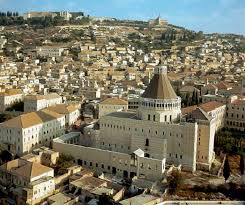Nazareth Refugees Get Aid, United Press, NY Times, Aug. 6, 1948.
 CAIRO, Egypt, Aug. 5 (AP)-A Belgian priest said today that 1,000,000 francs [$22,800] had been collected in his country for the relief of war refugees in Nazareth, Palestine. Abbot Naveau said he visited shrines in Palestine last June, then launched an appeal for funds to all his countrymen through Belgian bishops. He is en route to Palestine to supervise the work.
CAIRO, Egypt, Aug. 5 (AP)-A Belgian priest said today that 1,000,000 francs [$22,800] had been collected in his country for the relief of war refugees in Nazareth, Palestine. Abbot Naveau said he visited shrines in Palestine last June, then launched an appeal for funds to all his countrymen through Belgian bishops. He is en route to Palestine to supervise the work.
ISRAEL PROPOSES PEACE
In a move of great constructive possibilities, Foreign Minister Shertok has requested Count Folke Bernadotte, the United Nations mediator, to try to arrange a peace conference for direct negotiations between Israel and the Arab states. This move, the first official proposal of its kind, is in line with the statesmanlike policy pursued by the Israeli Government since its formation and can be only welcomed, for two reasons. It helps to maintain the United Nations truce which, for lack of adequate enforcement machinery, is still subject to constant if, fortunately, so far only local violations. What is even more important, it recognizes above the din of conflicting claims that the aim of war is not only victory but also a lasting peace, and that in the case of Palestine in particular no peace will be lasting unless it brings about a reconciliation of the belligerents and an economic union which is one condition of the United Nations partition plan and the first condition for the survival of Israel itself.
This proposal confronts the Arab states with an important decision. They have turned down previous Israeli feelers for direct peace negotiations on the ground that such negotiations would involve a recognition of the Israeli state, something they still refuse. But there are two new developments which might induce them to reconsider their position. The first is that as a result of the United Nations mediation action they are already negotiating with Israeli indirectly, if at long distance, through the mediator, and might as well, and with greater benefit to themselves, negotiate directly across a round table, especially if the mediator is included in the conference. The second is that, partly as a result of the military stalemate and partly because of the agreement among the Big Powers, the Arab ranks are beginning to show growing rifts, and that King Abdullah of Trans-Jordan in particular has displayed an increasingly conciliatory attitude to the point of pledging himself “not to exclude any possible compromise that secures justice and prevents unnecessary bloodshed.” And King Abdullah, whose state is, after all, in more or less the same position as Israel in that it was carved out of the Palestine mandate, is not only the strongest military factor among the Arabs but also stands to gain most from a just peace.
Whether direct peace negotiations with Israel are acceptable to him, and if so whether he can persuade the other Arab states, in particular belligerent Egypt, to join him, remains to be seen. But it would seem that the sooner such negotiations start the better the chances for their success. For both sides are exposed to the pressure of extremist elements in their midst, such as the Arab Higher Committee and the Irgun Zvai Leumi, both of which still claim all Palestine for their side. And these elements not only endanger the continuation of the truce but also tempt their respective sides to expand their claims, which car. only make the conclusion of final peace more difficult.



